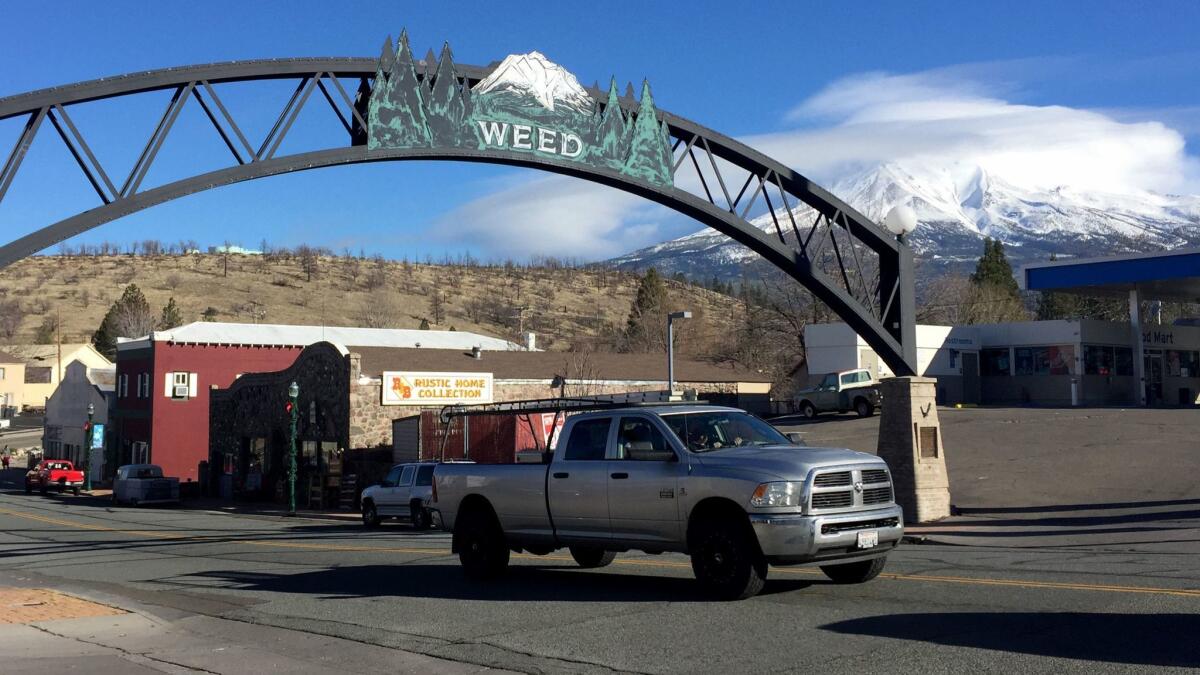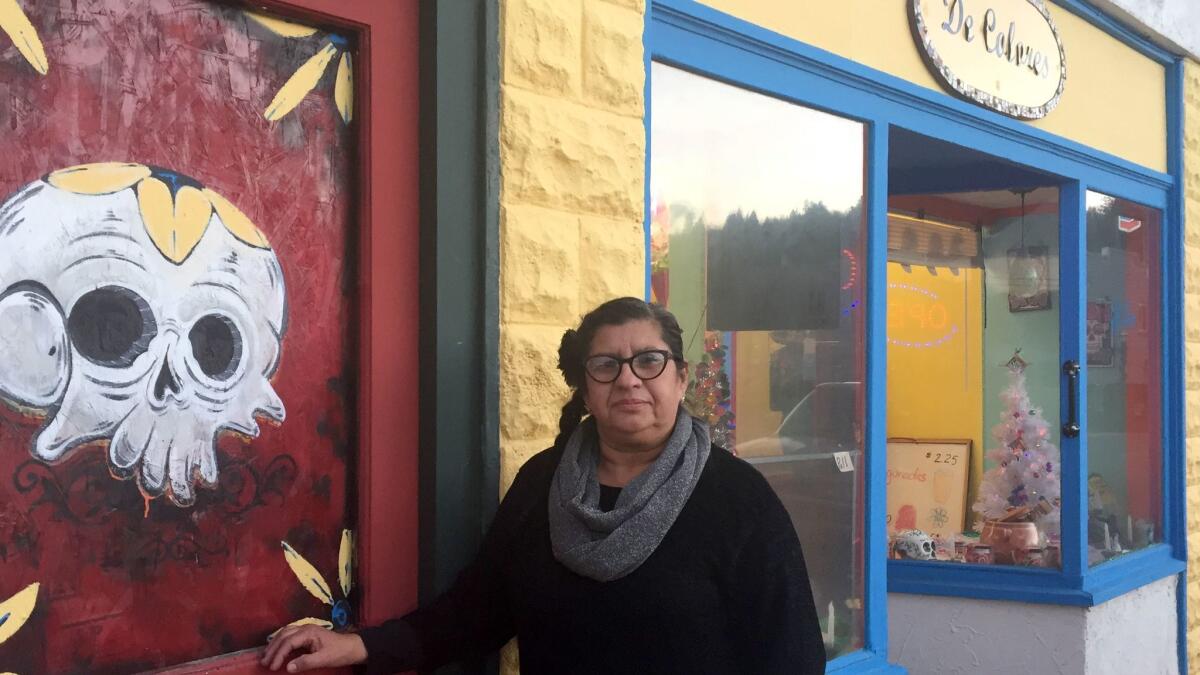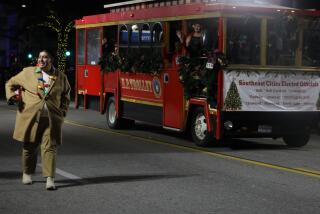In rural California town where Trump won, Latino minority says goodwill prevails as always

Cecilia A. Rodriguez planted her feet for what she imagined loomed right around the corner in this tiny Northern California logging town.
She had welcomed the chance to raise her children away from the ills of a big city when her husband got a job here 30 years ago.
Then it dawned on Rodriguez that her family would be a relative anomaly in this small, sleepy enclave in the foothills of snow-capped Mt. Shasta: Mexican American.
“I was like, ‘Oh my Gosh. None of my people are here,’” said Rodriguez, 54. “It was all white people.”
But the suspicious stares and vaguely — and maybe not so vaguely — hostile words never came.
Her three sons’ best friends, like the majority of people in this Siskiyou County town, were white and her family became just another thread woven into the fabric of Weed, population roughly 2,500.
“I never had the feeling of being an outcast,” she said.
That feeling didn’t change when the majority in Siskiyou County voted for Donald Trump.
Latinos have surpassed whites as the largest group in California; but Siskiyou County, like other sparsely populated and mostly rural parts of the state, is mostly white, with a strong conservative streak. Trump won about 55% of the vote in Siskiyou County.
Except for Humboldt, which Clinton won, Trump also claimed victories in the other adjoining counties: Modoc, Del Norte, Trinity and Shasta.
In Weed, a town that has cleverly marketed its marijuana-associated name to sell shirts, mugs and other merchandise with slogans like “Enjoy Weed,” about 16% of the residents are Latino. That’s higher than the estimated 10% of Latinos in Siskiyou County as a whole, according to the 2010 census.
An estimated 80% of Latinos who voted cast their ballot for Clinton in California, according to survey data from the research firm Latino Decisions.
Still, at a time when the country seems split along racial, political and social lines, Weed is one place where people say they generally get along despite — and sometimes because of — their differences. And one election, however polarizing, wouldn’t easily change that.
Isabel Z. Quiroz, the owner of a Latino-themed novelty store called De Colores, jokingly speculated that maybe the bitterly cold weather in the fall and winter kept things from getting overheated.

“You spend a long time having to prepare for winter,” Quiroz said. “People don’t care about politics. If you don’t have enough wood, you’ll freeze.”
“We have different priorities. Perhaps we just don’t have time for racism,” Rodriguez, her friend, quipped during a visit.
Founded by Abner Weed, the town was once had a vibrant lumber industry that became a magnet for Italians and African Americans.
Many Italians settled at the turn of the 20th century. A large number of African Americans migrated from the south to work at the local mill. But people were segregated to live in separate parts of town based on their race, said Harold Orcutt, president of the board for the Weed Museum.
That began to change in the 1970s when people started to mix and live wherever they wanted to. Laotians migrated to town in the 1980s, as did more Mexicans.
Weed Mayor Pro Tem Bob Hall said the town rose above its racially polarized past.
“I just think it’s just kind of who we are in California. We’re open,” he said. “We respect each others’ ethnic backgrounds.”
Nila Pineda, a native of El Salvador in the country under a temporary protected immigration status, said Weed and its people have been good to her in the 12 years that she has called the town home.
After the election, she had trouble reconciling the president-elect’s harsh rhetoric on immigration with the fact that people in town — some of whom she had to know — voted for him.
“I don’t know why they would vote for him,” she said. “The Americans here aren’t racist. Why would they vote for him?”
Greg Jeter, the owner of the Sacred Ground Tattoo and Healing Center, said he cast his vote for Trump for the same reason millions of people did.
He wanted a political outsider in the White House, someone he thought would rattle cages to create American jobs and who wouldn’t be touched by “corrupt mainstream politics.”
He also supported the billionaire’s call for immigration enforcement, especially for deporting people in the country illegally who have criminal records.
On a recent weekday morning, just weeks after the presidential election, Quiroz visited Jeter, greeting her tattoo artist friend with a hug.
Jeter helped Quiroz organize the town’s first Dia de los Muertos celebration.
But when their conversation turned to Trump, they discovered they were on opposite ends of the political aisle.
Jeter, 51, said he just wanted people to come to the U.S. legally and for the country to further fortify its Southwest border.
Quiroz, a Clinton supporter with cat-eyed-rimmed glasses and a side-braided ponytail, told Jeter she wouldn’t be here today if it weren’t for illegal immigration.
“You know, my grandparents came here illegally. They were fleeing the war in Mexico,” she said of the Mexican Revolution, which started in 1910. “I wouldn’t be here if it wasn’t for them. My mother was born here. Our family has always been hard working and immigrants.”
Jeter said he understood, but those were different times, he added.
Quiroz, 59, told Jeter that she feared that immigrants, including those who have never committed a crime, might be rounded up during Trump’s presidency.
“People are going to get racially profiled. I’m Latina and people may just look at me and think I’m Mexican from Mexico because of how I look. My family has been here for generations,” she said. “If I were walking down the street, I could get picked up. I’m your friend. How do you feel about that?”
Jeter told her that wouldn’t be right, but he was firm in his defense of Trump on immigration.
At the end of their conversation, Jeter and Quiroz embraced, unflinching in their friendship.
It’s not hard to get angry in a small town. But it’s unhealthy to remain so for long.
“In a bigger city you can afford to offend other people and get away with it,” Jeter said. “That’s a blessing in a small town; you have to be careful of what you say.”
Quiroz moved to Weed about eight years ago. She invested her retirement savings into the shop she opened in October of last year. De Colores looked like a hipster-like, Latino-themed store with sugar skulls and graffiti art, the kind of business that would melt into the landscape of gentrifying Echo Park more seamlessly than Main Street in Weed.
The town’s Latinos, a minority of which are living in the U.S. illegally, buy their Mexican sweet bread, tortillas, tamale husks and chiles here. Aside from the local Catholic Church, the store has arguably become the center of Latino life in Weed.
But over the years, some of her most loyal customers have been white, particularly boys and girls, who favor fare like Takis — tortilla snacks from Mexico commonly sold by immigrant push-cart vendors in places like Los Angeles.
On a recent weekday, Cale White, 12, and brothers Shawn Nolan, 12, and Strider Albrecht walked into the store, looking to buy the snacks.
“These boys are my No. 1 customers,” Quiroz said, signaling toward the boys, who sprawled on red velvet chairs with their newly bought stash of Takis Fuego.
“If I had money for all the bags of Takis, I would buy them all,” Cale exclaimed.
“We bought three large bags yesterday” said Strider, 14. “Takis are my favorite chip.”
He said he and his brother acquired a taste for Takis while visiting their grandmother in a heavily Latino neighborhood in Bakersfield.
Even when the town was racially segregated, Weed’s children all went to the same grade school, said Socorro Sanchez.
A teachers aide at Weed Elementary School, Sanchez, 50, was born and raised in the town after her Mexican father moved there to work at the local mill. She raised her children in Weed.
Her son Gabriel told her he never experienced any prejudice until he moved to a larger town in the Central Coast for college.
“You don’t understand discrimination because you’ve never felt it, never been around it,” he told his mother.
Still, it can be difficult to keep the outside world and it’s political upheaval from penetrating life at Weed.
Rosa Sujey, the mother of two American-born children who attend the school, said her worried daughter asked her a pointed question after the election.
“Mom are we going to start packing our bags?” recalled Sujey, who is in the country illegally and in the process of becoming legalized.
Sujey, who cleans homes for a living, reassured her children, confident that the family would be safe, at least in places like Weed.
Inside the De Colores store, Rodriguez browsed with her sister Maria Guadalupe Escobar, who was visiting from Los Angeles.
Rodriguez, who moved to Weed from San Jose, said she tends to stay away from politics, especially during the last election cycle. Many of her friends are Republicans.
“I’m afraid to bicker and fight,” she said.
Escobar said she liked to visit Weed regularly because it took her away from L.A., where the punishing election and its divisive rhetoric led to street protests just a short walk from her home.
In the beginning, Escobar said her daughters did not like their mother visiting Weed — especially after the election. They thought that as a Latina she was bound to have at least one unpleasant episode.
Rodriguez and Escobar laughed about their concerns.
“Nothing here has changed,”said Escobar, who voted for Clinton and is hunting for land to move to Weed. “It’s calm. It’s a totally different world. You forget about what’s happening in the outside world—the big city.”
Follow Cindy Carcamo on Twitter @thecindycarcamo
ALSO
As Inauguration Day nears, Muslims wonder whether Trump’s tough talk will turn into action
What it means to be a Muslim American in the age of Trump
More to Read
Start your day right
Sign up for Essential California for news, features and recommendations from the L.A. Times and beyond in your inbox six days a week.
You may occasionally receive promotional content from the Los Angeles Times.







